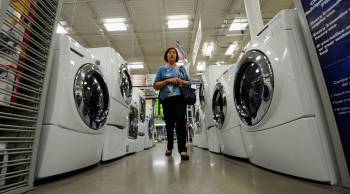
Boeing is a cautionary tale about current American manufacturing
Boeing is a cautionary tale about current American manufacturing

Nearly two decades ago, Miles Arnone worked at an investment firm trying to rehabilitate troubled companies. One of them made rug cleaning equipment.
“It had been around a long time, it had a very strong brand,” recalled Arnone. A private equity firm had previously bought it and came up with a way to increase profits “by closing their U.S. plant and moving production to China.”
It worked.
“The U.S. company’s profits did increase in the near term. They got the product from China for less than they were making in the U.S., and their profits spiked,” Arnone said.
The private equity firm sold the revamped business, made money and moved on. But something was lost at the rug cleaning equipment company: When engineers and designers are close to the people making their product, they can talk.
“The engineers can go to the tool shop, they can go to the assembly plant, they can go and talk to people and see for themselves,” explained Jim Morgan, a senior adviser at the Lean Enterprise Institute who started off as a machinist himself on a factory floor. “Manufacturing might say, ‘Hey, you know, I see what you’re doing there, but I think that could be a quality issue on the shop floor.’”
Eventually, the rug cleaning machine company felt it made sense for engineering to move as well — over to where the manufacturing was happening in China. There was an economic downturn, so the firm really wanted to cut costs, Arnone said. “Now, we’re starting to lose the ability to even direct what the product would be.”
After a while, the producer in China started dictating designs and selling to other companies in the U.S.
“And that was it. The company’s ability to differentiate its product declined dramatically, their ability to command the market through the release of new and innovative products declined dramatically, performance suffered,” Arnone said.
The company still exists but is “a shell of its former self,” according to Arnone.
Arnone is now CEO of Re:Build, a custom high-tech manufacturer based in Massachusetts. He said echoes of this story — where short-term financial gain came with long-term costs, where manufacturing was devalued and shipped out — can be heard at some U.S. manufacturers today.
Jerry Useem would argue that includes manufacturers like GE and Boeing. Useem has covered Boeing for more than two decades and is a contributing writer at The Atlantic.
“A lot of it was financially driven in the sense that you could make your balance sheet look better by having other parties assemble big chunks of your product in a way that would drive short-term results,” he said.
“GE pioneered this,” said Ben Armstrong, executive director of the MIT Industrial Performance Center. “[Former CEO] Jack Welch was famous for driving outsourcing, moving more production offshore.”
In an interview with Fortune magazine, former GE executive David Cote said manufacturing came to be considered “grunt work.”
Outsourcing can indeed make good economic sense. A business may want to produce close to its market, and some places are just better at making certain things. But taken too far, innovation, safety and competitiveness can suffer.
“In Boeing’s case especially,” Useem said, “it ended up more expensive than if it had kind of just stuck with its original culture of manufacturing first, you know, put the factory floor at the center of the corporation rather than trying to kind of shove it to the periphery.”
Outsourcing, particularly outsourcing abroad, reached a scale in the U.S. over decades that many now argue had consequences.
“American manufacturing jobs are half of what they once were,” said Armstrong of MIT. “And it’s one of the most consequential economic transformations of the last 50 years.”
After World War II, 1 in 3 manufacturing workers worked at a large plant with over 1,000 people, according to Armstrong’s data. Now it’s less than 1 in 6. Many small manufacturers have turned to the department of defense to help sustain themselves. About 40% of mid- and small-sized factories have at least one defense contract, according to Amstrong’s analysis.
“We made this bed in the 1980s, and now we’re lying in it,” Armstrong said, referring to the idea that you can just invent things here and make them over there overlooked the connection between the factory floor and the engineering and inventing.
“The hidden cost of all that was that once you start making more and more things abroad, it’s harder and harder to invent when you don’t have the capability to make,” he said.
Reversing this is also hard.
“If I’m making vacuums in the U.S. and I stop doing that and send it to China and everyone does that, then the company that makes the bearings that go into the vacuums in Ohio goes out of business too,” Arnone said. “So, all these pieces wilt and wither away.”
The federal government is now trying to resuscitate American manufacturing supply chains — especially in critical areas — with hundreds of billions of dollars from the CHIPS Act, the Inflation Reduction Act and the Bipartisan Infrastructure Law. Arnone said the U.S. will need more.
There’s a lot happening in the world. Through it all, Marketplace is here for you.
You rely on Marketplace to break down the world’s events and tell you how it affects you in a fact-based, approachable way. We rely on your financial support to keep making that possible.
Your donation today powers the independent journalism that you rely on. For just $5/month, you can help sustain Marketplace so we can keep reporting on the things that matter to you.

















